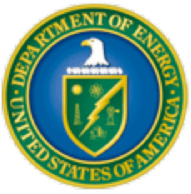Argonne National Laboratory, July 6-9, 2010
Update to this Website for January 27, 2011
The final report, Computational Scattering Science 2010, has been edited and typeset. It can be downloaded here.
Local Arrangements and Access
The Workshop will meet in Bldg. 240 on the Argonne site, conference room 1416.
All attendees must get visitor badges from the Argonne Visitors' Center upon arrival. It is necessary to present a photo ID to obtain a visitor badge.
Scope and Objectives
High performance computing can facilitate and elevate scientific achievements in neutron, x-ray and electron scattering studies on materials. Experimental scattering techniques have seen rapid advances with national investments in facilities for x-ray and neutron scattering. Likewise, computational capabilities have made rapid advances with trends in hardware, materials theory, and software engineering. It is time to reassess the relationship between experimental and computational scattering science.
The workshop is by invitation only, and is organized as a set of topics led by the persons listed below. Each topic leader and team will document a vision for opportunities in computational scattering science. The Workshop Report will present a near-term roadmap for how computing can advance scattering research using methods available today, and chart new capabilities for computationally-leveraged scattering science.
The organizing principle for the workshop is how modern computations of the structure and dynamics of materials can predict the elastic and inelastic scattering observed by experiment. Ideas will also be sought to organize software development, and manage maintenance, upgrades, and user support. The Workshop Report will present possible paths forward, critically assessing their strengths, weaknesses, and cost-effectiveness.
Schedule, Topics, Leaders
Tuesday July 6
1 PM Meeting of organizers and group leaders
- flash presentations of topics
- discussion of logistics for main meeting
Wednesday July 7
8:30 Introductions and Overview
9:00 Presentations of topics by group leaders
7 topics: 15 minutes+5 min for questions each. Allowance for 20 min break.
12:00 Lunch
1 PM Presentations of topics by group leaders
6 topics: 15 minutes+5 min for questions each. Allowance for 20 min break.
3:40 PM General Discussion
4:30 PM Planning for Day 2
Thursday July 8
8:30 AM Four Parallel Topical Sessions
Correlated Electron Problems. Mike Norman (ANL)
Chemical Processes Far from Equilibrium. Lin Chen * (Northwestern U and ANL)
Nanostructures - Structure and Dynamics. Joe Curtis * (NIST)
Large-Scale Finite Element Methods. Cev Noyan * (Columbia)
Computing Resources, Data and their Management. Mark Hagen * (SNS)
9:30 AM Five Parallel Topical Sessions
Fast and Ultrafast Phenomena. Fernando Vila * (UW)
Complex Matter. Robert McQueeney * (ISU)
Materials Simulations and Scattering Cross Sections. Brent Fultz * (Caltech)
Technology for Heuristic Optimization of Complex, Ill-conditioned Models. Brian Toby * (APS)
Multicore Computing Architecture. Michael A.G. Aivazis (Caltech)
10:30 Break
11:00 AM Four Parallel Topical Sessions
Software Development and Community Expectations. Gabrielle G. Long * (APS)
Software Maintenance and User Support * Frans Trouw (LANL)
Education and Career Paths. Ray Osborn * (ANL)
Financial Support. Kenneth W. Herwig * (SNS)
12:00 Lunch
1:00 PM Four Parallel Writing sessions
Correlated Electron Problems. Mike Norman (ANL)
Chemical Processes Far from Equilibrium. Lin Chen * (Northwestern U and ANL)
Nanostructures - Structure and Dynamics. Joe Curtis * (NIST)
Large-Scale Finite Element Methods. Cev Noyan * (Columbia)
Computing Resources, Data and their Management. Mark Hagen * (SNS)
2:00 PM Five Parallel Writing sessions
Fast and Ultrafast Phenomena. Fernando Vila * (UW)
Complex Matter. Robert McQueeney * (ISU)
Materials Simulations and Scattering Cross Sections. Brent Fultz * (Caltech)
Technology for Heuristic Optimization of Complex, Ill-conditioned Models. Brian Toby * (ANL)
Multicore Computing Architecture. Michael A.G. Aivazis (Caltech)
3:00 Break
3:30 Four Parallel Writing sessions
Software Development and Community Expectations. Gabrielle G. Long * (APS)
Software Maintenance and User Support * Frans Trouw (LANL)
Education and Career Paths. Ray Osborn * (ANL)
Financial Support. Kenneth W. Herwig * (SNS)
Friday July 9
8:30 Presentations of writings by topic leaders
10 minutes each, allowing for 30 minute break
12:00 Lunch
1 PM Discussion
common themes. how to assess opportunities for best value, how to measure success.
3 PM Break
3:30 PM Organizers to submit first draft.
* confirmed
Organizers
Brent Fultz, California Institute of Technology
Kenneth W. Herwig, Spallation Neutron Source
Gabrielle G. Long, Advanced Photon Source
Sponsors
National Science Foundation (Division of Materials Research, Division of Chemistry, Office of Cyberinfrastructure)
Department of Energy, Office of Basic Energy Sciences (Division of Materials Sciences and Engineering, Scientific User Facilities Division)
![]()
